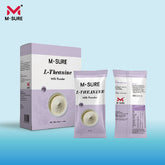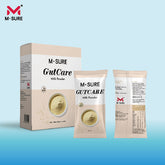Key Nutrient Deficiencies in Older Adults
by
BiotechAusway
21 Jul 2025
I. Protein Deficiency: Accelerating Muscle Loss and Immune Collapse
⚠️ Core Risks
-
Sarcopenia: A protein deficit of ≥7g/day leads to muscle loss, increasing fall and fracture risk.
-
Immune Dysfunction: More than 20% deficiency causes thymus shrinkage and T-cell reduction, increasing mortality from infections (e.g., pneumonia).
👥 High-Risk Groups
-
Older adults avoiding meat, eggs, and dairy while consuming staple-heavy diets.
-
Protein deficiency exceeds 60% among adults aged ≥75 years.
II. B-Vitamin Deficiencies: Neurological and Metabolic Crises
1️⃣ Vitamin B12 Deficiency
-
Prevalence: >28% in adults ≥50 years
-
Neurological Impact:
-
Peripheral neuritis (limb numbness)
-
Memory decline → brain atrophy → dementia
-
-
Hematological Impact:
-
Megaloblastic anemia → fatigue, cold intolerance, and organ hypoxia
-
2️⃣ Folate (Vitamin B9) Deficiency
-
Elevated homocysteine levels increase stroke risk by 40%
-
Critical for patients with brain atrophy
3️⃣ Vitamin B6 Deficiency
-
Disrupts amino acid metabolism
-
Exacerbates neurodegenerative conditions
III. Bone-Related Nutrient Deficiencies: Disabling Fracture Risks
🦴 Common Deficiencies
-
Vitamin D:
-
Affects >80% of middle-aged and older adults
-
Reduces calcium absorption by 50%
-
Consequences: osteoporosis, muscle weakness, even lower-limb paralysis
-
-
Calcium + Vitamin K2 Deficiency:
-
Leads to poor calcium deposition → low bone density
-
Doubles vertebral fracture risk
-
-
Vitamin C Deficiency:
-
Impairs collagen synthesis
-
Slows bone repair and healing
-
IV. Other Critical Deficiencies and Cascading Effects
❗ Nutrient-Linked Health Risks
| Nutrient | Health Consequences |
|---|---|
| Iron | Anemia → hypoxic heart damage, GI distress (nausea/constipation) |
| Zinc | Taste loss → poor appetite → malnutrition → weakened immune defense |
| Dietary Fiber | Constipation, ↑ colorectal cancer risk, 21% ↑ risk of dyslipidemia and diabetes |
Over 60% of elderly individuals are deficient in dietary fiber.
V. Interventions: Precision Supplementation and Dietary Optimization
| Nutrient | Food-Based Solution | Disease Prevention Target |
|---|---|---|
| Protein | 1 egg + 100g lean meat + 300ml yogurt daily | Sarcopenia, infection resistance |
| Vitamin B12 | Animal liver or deep-sea fish, 3x per week | Neuroprotection, anemia correction |
| Vitamin D | 30-minute sunlight exposure + fortified dairy | 34% ↓ fracture risk |
| Dietary Fiber | 50g oats + 300g dark leafy greens daily | 24% ↓ diabetes risk |
📝 Customize plans for comorbidities. For example, diabetics should avoid high-GI fruits like lychee.
💡 Critical Insight
Nutrient deficiencies in older adults often present as "hidden hunger" — asymptomatic, yet silently increasing the risk of chronic disease.
-
70% of diabetes and cardiovascular diseases are linked to chronic nutritional imbalances
-
Recommendation: Begin serum vitamin and homocysteine testing from age 45






